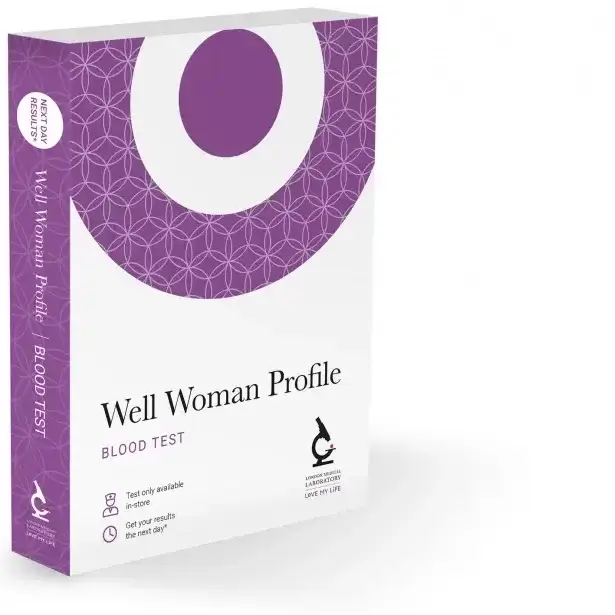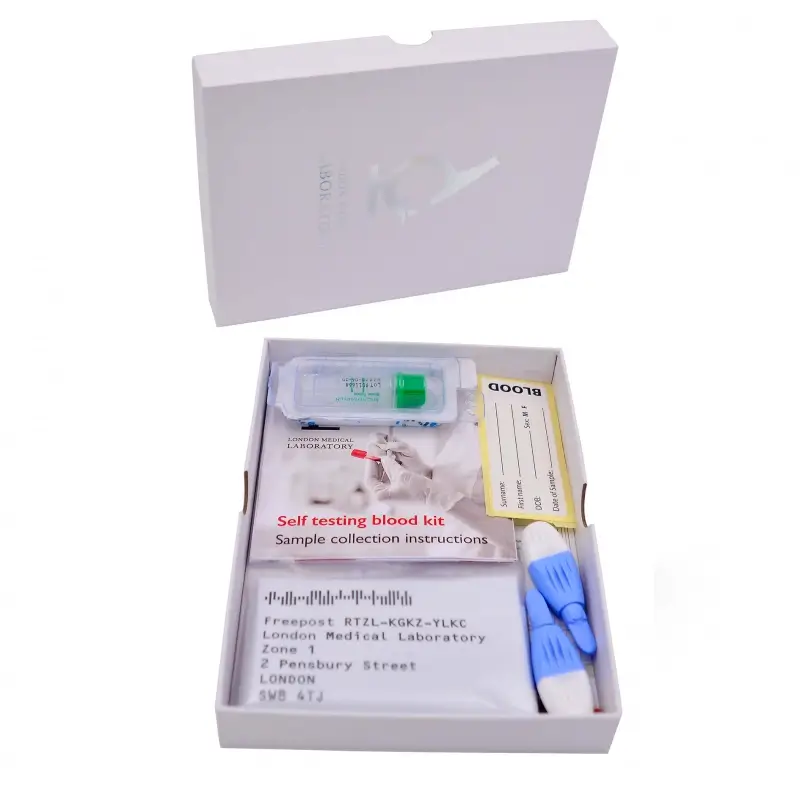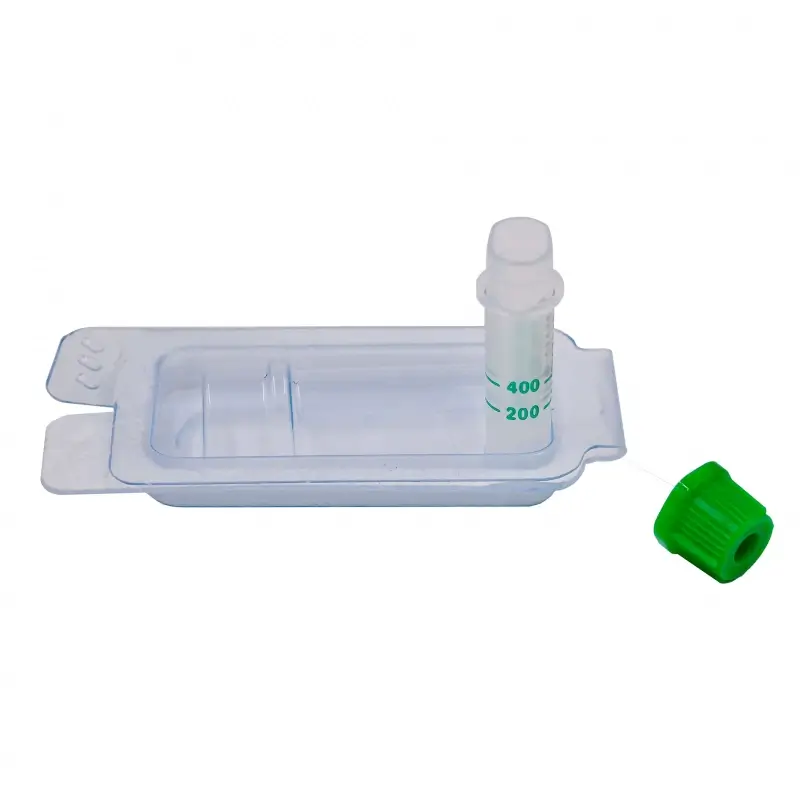
Well Woman Profile
Our Most Comprehensive Wellness Check For Women
We have partnered with London Medical Laboratory to provide you with our most in-depth female wellness check. Contact your local pharmacy branch to arrange your appointment, where we can confirm the price per test prior to making your booking.
An Introduction to the Well Woman Profile
Understanding what is happening in our bodies can help us to improve our overall sense of wellbeing and make conscious healthy dietary and lifestyle choices moving forwards. If you are interested in exploring how to support your health and wellbeing, keep reading to learn more about our most detailed and comprehensive wellness profile for women.
How Does The Well Woman Profile Test Work?
A blood test is a simple and effective way to both screen for underlying health concerns and monitor conditions that have already been diagnosed by a health professional.
Whether you have a specific health concern, are working to manage an existing condition or you are simply curious about your overall health, a straightforward blood test is an affordable, easy and efficient way to understand your health.
We offer testing in our pharmacy branches in order to ensure the process is as convenient, stress-free and simple as possible.
Following your appointment, you will receive the results of your Well Woman Profile test within 5 to 7 days.
Please note that no blood test is a substitute for consulting your doctor, especially if you are experiencing any symptoms that are causing you concern. You must not self-diagnose a medical condition or begin treatment without first meeting with your doctor or a fully-trained medical professional.


What Does The Well Woman Profile Test?
Our Well Woman Profile includes tests for a number of different biomarkers in order to produce an overall picture of your health. Let’s take this opportunity to look at each of the biomarkers that will be tested in more detail, including what they may help you to understand about your health and wellbeing.
BLOOD CELLS (1 BIOMARKER)
– Full Blood Count
A full blood count (FBC) is often used to check your overall health, as it looks at each of the different cells that can be found in the blood. Haemoglobin is found within red blood cells and is responsible for carrying oxygen to tissues throughout the body. White blood cells are connected with the immune system and work to protect the body from viruses and bacteria.
A FBC test can detect a variety of different health concerns, including infections, anaemia, and leukaemia. However, it is important to note that if one or more of the biomarkers on a FBC is above or below the normal range, this doesn’t necessarily mean that you have a health condition. All results should be discussed with a medical professional and looked at as a whole, not individually.
CHOLESTEROL (6 BIOMARKERS)
High levels of cholesterol can contribute to blocked arteries, which, if left undetected and untreated, could lead to heart attack, coronary heart disease, or stroke. Understanding your cholesterol levels can support you to make healthy dietary and lifestyle changes that will minimise your chances of developing a serious health condition.
– Total Cholesterol
This biomarker looks at the total level of cholesterol that is present in your blood, including both high density and low density lipoprotein cholesterols. The body uses cholesterol to produce reproduction, growth and development hormones, but too much cholesterol can cause problems. The total cholesterol biomarker is often used by medical professionals to help estimate someone’s risk of developing a heart condition.
– High Density Lipoprotein (HDL)
HDL is also known as the body’s ‘good’ cholesterol, because it works to remove the ‘bad’ cholesterol from arteries in the heart. Maintaining good levels of HDL can minimise your risk of developing heart disease.
– Low Density Lipoprotein (LDL)
Conversely, LDL is the ‘bad’ form of cholesterol because it can build-up and cause blockages in the heart’s arteries. Keeping your levels of LDL within the normal range can help you to reduce your chances of developing heart disease.
– Total Cholesterol: HDL Ratio
This biomarker calculates the ratio between ‘good’ HDL and ‘bad’ LDL, which will give you a good idea of how well equipped your body is to keep your arteries clear of blockages and minimise your risk of experiencing heart disease.
– Non-HDL Cholesterol
This test is often used to understand your lipid profile when estimating your risk of developing a cholesterol related heart condition. This is the total amount of non-HDL cholesterol in your body.
– Triglyceride
Triglyceride is a form of fat that the body stores in its tissues, which is commonly derived from foods including oil and butter. This test is also used to understand your lipid profile and can inform how likely you are to experience heart disease.
DIABETES (1 BIOMARKER)
– Haemoglobin A1c (HbA1c)
Undiagnosed and unmanaged diabetes is a leading cause of death in the UK. This simple blood test can confirm whether you have diabetes or whether you are at risk of developing it in the future.
Glucose builds up in the blood and connects with the haemoglobin that is present in red blood cells. As the average lifespan of a red blood cell in humans is around 120 days, the HbA1c test measures your average blood sugar levels over the previous 8 to 12 weeks, which can tell you whether or not you have diabetes.
HORMONES (4 BIOMARKERS)
There are a number of hormones that regulate and support different processes and functions within the body, including fertility, appetite, metabolism and growth. Sometimes an imbalance in these hormones can occur, which can cause a variety of conditions and symptoms.
– Oestradiol
Oestrogen is the primary hormone that is produced in the bodies of women who are not pregnant and oestradiol is a form of this hormone. This biomarker can help to evaluate ovarian function and can help to monitor the effects of hormone replacement therapy (HRT) in menopausal and perimenopausal women.
– Follicular Stimulating Hormone (FSH)
The pituitary gland produces FSH, which is a reproductive hormone that stimulates the development and growth of unfertilised eggs. It also initiates the production of oestradiol and progesterone. This biomarker can help to test for a range of conditions including disorders of the pituitary gland and infertility.
– Luteinizing Hormone (LH)
This reproductive hormone is also produced by the pituitary gland and it works to regulate ovulation and the menstrual cycle. Testing your LH levels can potentially support the diagnosis of reproductive issues.
– Prolactin
Another hormone that is produced by the pituitary gland, prolactin’s primary role is to stimulate the production of breast milk after childbirth and during pregnancy. Testing your prolactin levels can help to diagnose menstrual problems and infertility.
INFLAMMATION (1 BIOMARKER)
Inflammation occurs when white blood cells are working to protect your body from viruses and bacteria. Understanding your body’s inflammation levels can help to identify a number of conditions.
– High Sensitivity C-Reactive Protein (hs-CRP)
CRP is a protein present within the blood that can increase when the body is experiencing inflammation. This high sensitivity test can measure lower levels of CRP and can help to determine your risk of developing certain heart conditions.
IRON STUDIES (6 BIOMARKERS)
– Iron
Iron is an important mineral that is used by the body to create new, healthy red blood cells. Iron deficiency can cause a number of different symptoms including shortness of breath, chest pains, and fatigue.
– Total Iron Binding Concentration (TIBC)
This biomarker measures the maximum amount of iron that your blood can transport, which can help to determine how well your body is absorbing and utilising iron. TIBC tests can help to diagnose various conditions including anaemia and haemochromatosis. Please note that if you have liver disease, your TIBC levels will be impaired.
– Unsaturated Iron Binding Concentration (UIBC)
This biomarker specifically measures the amounts of transferrin that is specifically used to transport iron around the body. UIBC tests can help to identify conditions associated with iron toxicity, such as haemochromatosis.
– Ferritin
Measuring this important protein can provide an understanding of how much iron is stored in your body. This test can help to diagnose conditions including liver disease and anaemia.
– Transferrin
Produced by the liver, transferrin is a glycoprotein that plays a key role in transporting iron around the body. This is another biomarker that can help to determine your overall iron status and diagnose conditions including anaemia.
– Creatine Kinase
This important enzyme can be found in the heart, skeleton and brain tissue, albeit in smaller amounts. This biomarker can help to diagnose and monitor conditions affecting the muscles, including injuries and more serious concerns such as muscular dystrophy.
KIDNEY FUNCTION (5 BIOMARKERS)
The kidneys play a key role in ensuring your body is functioning properly and they are responsible for waste removal, controlling red blood cell production, and releasing hormones that help to regulate blood pressure. Healthy kidney functionality is closely linked with maintaining good health and wellbeing.
– Urea
Healthy kidneys filter this waste product from the bloodstream to be excreted from the body in urine. Urea tests can be used to understand how well your kidneys are working and whether you are at risk of developing liver or kidney disease.
– Creatinine
When the muscles contract, a waste product called creatinine is produced. The kidneys also work to filter out creatinine from the bloodstream to be excreted in urine. This is another test that can help to determine how well your kidneys are working.
– Glomerular Filtration Rate (GFR)
Glomeruli are present in the kidney and are what work to filter out waste products from the blood. The GFR test can help to identify and monitor any changes occurring in your kidneys that may affect their functionality.
– Calcium
Calcium is a mineral that is found in our bones and in our bloodstream. It supports a number of processes in the body, including blood clotting. This biomarker can help to diagnose and monitor a number of health conditions affecting the kidneys, heart and bones.
– Adjusted Calcium
Also known as corrected calcium, this biomarker specifically measures albumin which can calculate how much calcium is freely present in the blood. Again, this biomarker can help us to understand whether any health concerns are affecting the kidneys, heart or bones.
LIVER FUNCTION (8 BIOMARKERS)
The liver supports a range of essential bodily functions, including fighting infections, regulating blood sugar, and detoxifying the blood.
– Albumin
Produced by the liver, albumin is a protein that works to support the transportation of vitamins and hormones throughout the body. This biomarker can be used to diagnose and/or monitor diseases affecting the kidneys and liver.
– Globulin
Globulin is another essential protein which supports the overall functionality of the liver, particularly with regard to fighting infection and blood clotting. Globulin tests can be used to identify conditions impacting the kidneys and liver, as well as indicating certain autoimmune disorders.
– Total Protein
This biomarker measures the total amounts of globulin and albumin in your blood serum. Albumin helps to retain fluid within your bloodstream and globulin is an essential element of a healthy immune system.
– Alkaline Phosphatase (ALP)
ALP is an enzyme that is mostly found in the bones and liver, so it can help to identify diseases affecting these specific parts of the body.
– Alanine Transaminase (ALT)
ALT is released into the bloodstream following injury to the skeletal muscles, kidneys, liver or heart. This biomarker is most commonly used to diagnose diseases impacting the liver.
– Aspartate Aminotransferase (AST)
Much like ALT, AST is also an enzyme that is released into the bloodstream following injury to the liver, heart or skeletal muscles.
– Gamma Glutamyl Transferase (GGT)
This enzyme is mostly present in the liver, but it can also be found in the kidneys, pancreas, spleen and gallbladder. GGT is used by the liver when metabolising drugs and other toxins. This biomarker can help to identify liver disease or injury to the bile duct.
– Total Bilirubin
Bilirubin is found in bile, where it helps to digest food. Bilirubin is also produced when old red blood cells are broken down. Total bilirubin tests can help to identify diseases affecting the liver, as well as certain forms of anaemia.
THYROID (2 BIOMARKERS)
Despite being relatively common, thyroid disorders often remain undiagnosed. Symptoms of thyroid disorders include weight issues, mood problems and tiredness.
– Thyroid Stimulating Hormone (TSH)
Produced by the pituitary gland, TSH is responsible for stimulating the thyroid gland, which can be found in the throat. Hormones produced by a healthy thyroid gland support a range of functions including maintaining muscle strength, regulating weight and regulating body temperature.
– Free Thyroxine (Free T4)
This hormone is produced by the thyroid gland and contributes to growth and metabolism. Measuring T4 levels can be helpful when diagnosing thyroid diseases, including hyperthyroidism and hypothyroidism, as well as when identifying female infertility issues.
VITAMINS (3 BIOMARKERS)
Vitamins support the normal function, growth and development of cells, which is why vitamin deficiencies can cause a vast array of conditions and symptoms.
– Vitamin D
Vitamin D plays a significant role in the absorption and regulation of magnesium and calcium, which is why it is so important for maintaining overall bone health. Vitamin D can be produced in the skin following exposure to sunlight and it can be obtained via supplements and foods. Despite this, vitamin D deficiencies are very common in the UK and can cause a range of symptoms, including tingling in the hands and feet, muscle weakness, bone pain and fatigue.
Vitamin D tests can also be used to diagnose and monitor diseases that impede the absorption of fat, including Crohn’s disease.
– Vitamin B12
Vitamin B12 is an essential vitamin in the formation of healthy red blood cells and tissue. It also plays a role in cellular repairs and the maintenance of good overall nerve health. Vitamin B12 can be obtained via supplements or foods, including eggs, milk, poultry, fortified plant milks and nutritional yeast.
Vitamin B12 deficiencies can also cause a wide range of symptoms, including depression, mouth ulcers, the feeling of pins and needles in your hands and feet, nausea, poor appetite, weakness and fatigue.
This biomarker can help to diagnose causes of anaemia, as well as identify whether you have a condition that is affecting absorption in your small intestine, such as Crohn’s disease or coeliac disease.
– Folate (Vitamin B9)
Folate also plays a vital role in the formation of new, healthy red blood cells and tissues. It is also an important vitamin during pregnancy, with pregnant women advised to take a regular supplement to maintain healthy levels.
If you have low folate levels, you may experience a range of symptoms, including neurological issues, mouth sores, weakness and fatigue.
Folate can be found in various foods, including citrus fruits, yeast and vegetables. Like Vitamin D and Vitamin B12, folate tests can help to indicate whether you have a malabsorption issue or folate-deficiency anaemia.
If you decide to book a Well Woman Profile test, it is important to discuss your results in detail with a trusted and qualified medical professional who has the skills and knowledge to explain what these biomarkers can tell you. There are a number of things that can affect blood test results in ways that don’t indicate a specific health concern, such as recovering from a mild infection or being mildly dehydrated.
To find out more about the Well Woman Profile test, please contact your local pharmacy branch where our team will be happy to provide more information.



